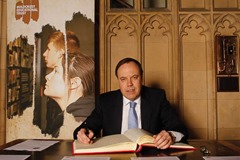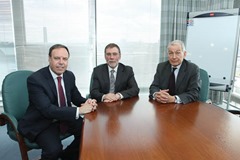Nigel Dodds interview: a national platform
 DUP MP Nigel Dodds talks to Peter Cheney about his party’s approach to Parliament and discusses its national and regional track record.
DUP MP Nigel Dodds talks to Peter Cheney about his party’s approach to Parliament and discusses its national and regional track record.
Nigel Dodds’ starting point as an MP is representing Northern Ireland’s interests in the United Kingdom Parliament but he and his party also want to “participate and play a role in the wider national questions and debates that come up there.”
In particular, the DUP deputy leader highlights the vote on potential military action in Syria. The House divided rejected the Government motion by 285 votes to 272. If all eight DUP MPs had voted in favour, the Government motion would have been carried. In the event, the five DUP MPs who were present helped to secure its defeat.
Dodds describes Parliament as “the national stage” in political terms and accepts, compared to the Assembly, a Northern Irish politician does not get as many opportunities to speak or play a leading role.
“Nevertheless,” he remarks, “the platform is so much bigger in terms of impact that you can make. Not just in the chamber but outside in the corridors, you can have a very influential role – if you wish to exercise it – in networking with very influential Cabinet and junior-level ministers for the benefit of your constituents and on the wider issues.”
When Dodds was first elected in 2001, devolution was “stop-start” and it was therefore “extremely important” to have a voice at Westminster.
Reflecting on the changes in Parliament since then, he notes that politicians are “generally not thought of as highly” either in the media or the wider population but Parliament has “asserted itself more.” New Labour’s massive majorities made Parliament a “plaything of government effectively” but that started to change in the latter days of the Brown administration.
“You saw Parliament becoming more and more crucial, votes becoming closer, the willingness of backbenchers in both parties – the Labour Party and Tory Party – to rebel has become much more marked,” Dodds points out. “That has, I think, given much more influence to the smaller parties generally.”
Conservatives have privately contended that the DUP could have ended Brown’s premiership if they had voted against 42-day detention in 2008.
“I doubt that,” he says. “What happens in that situation is that the Prime Minister of the day immediately calls a vote of confidence and wins that because all the rebels who have rebelled on the issue, all come back and say: ‘Oh yes, we do.’ It wouldn’t have brought the Government down.” The Government, though, would fall if it were defeated on the Budget.
“We’re not in the pockets of the Conservative Party and we’re not in the pockets of the Labour Party,” he adds. “It depends on the issue.” The DUP contends that, in this case, its decision was in the interests of national security.
The two main parties “would like to have us onside for all the big votes” but he sums up its approach as: “What is in the best interests of the people that elect us to Parliament from Northern Ireland and what is important to the country at large?”
Since the 2010 general election, he has seen a rising profile for Northern Ireland at Westminster. With the Lib Dems in government, the DUP has been given a “greater role behind the scenes” in Commons business.
The party’s successes – achieved along with other parties – include the devolution of long-haul air passenger duty, the retention of the Belfast Coastguard station and the £200 million counter-terrorism funding package for the PSNI. It has also secured regional exemptions from the UK Government’s welfare reform programme.
The DUP strongly supports the extension of the National Crime Agency (NCA) to Northern Ireland. Its work is currently limited to non-devolved matters such as customs and immigration but the SDLP and Sinn Féin have objected to giving it full powers in the province.
Mark Durkan thinks that a solution can be found but wants NCA officers to be accountable to the Policing Board. “I take Mark’s considerations very seriously,” Dodds responds. “I think they’re put forward validly but Sinn Féin just simply don’t want anything that smacks of Britain operating here.
“In terms of Mark’s point, I think he overemphasises a point of process to the point where he’s prepared to damage the fight against crime over something which is basically a technical point.”
The alternative would be to transfer all of the NCA’s powers and funding to the PSNI but Dodds says that this would be hard to justify to the Treasury, especially when other police forces are facing cuts. Sinn Féin, it is put to him, can continue to block the NCA through its veto in the Executive. He responds: “I think there’s an increasing understanding that that position is really not a sensible one so hopefully common sense will prevail at the end of the day.”
Dodds is pleased to see the Treasury’s plans to extend the fuel duty rebate to rural areas of the province.
He also wants to see the Armed Forces Covenant rolled out locally. It aims to ensure that military families receive the same treatment as civilian families but it allows for extra support for the injured and bereaved. This part of the covenant has been considered inconsistent with the Northern Ireland Act’s equality duty (Section 75) but DUP MPs have been working with ministers to resolve the problem.
Constituency
High levels of deprivation in North Belfast make welfare reform, tax credits and wider personal taxation particularly relevant issues for his constituents. “By and large,” Dodds comments, “the broad framework once it’s decided at Westminster will be implemented – and has to be implemented – in Northern Ireland under the parity arrangements.”
Surely a radical rethink of the block grant (£9.5 billion last year) would allow the province to break parity? As a former Social Development Minister, he points out the computer system would need to be replaced – at a substantial cost – and a different benefits system would make it harder for people to move between Northern Ireland and Great Britain. Fuel duty and VAT, also set by Westminster, directly affect the cost of living in North Belfast.
Dodds is a prominent Orangeman and has attended the ongoing loyalist protest at Twaddell Avenue. “Many, many of my constituents from the nationalist side [of the community] come to see me in my office,” he says. “The job of an MP is to obviously represent your political viewpoint so whatever MP is there, [they] will have a political stance that other people won’t agree with. You have to then represent anybody who comes to you on a constituency basis and I do that – and I think I’ve a good record in that regard.”
Next election
As for the 2015 general election, Labour has a “natural inbuilt advantage” as it can win with a smaller share of the vote than the Tories. This is due to Labour MPs generally having smaller constituencies, often in inner cities.
“It’s theirs to lose but I think the chances of a hung Parliament again are very high,” Dodds comments. “I think the Labour Party have maybe not done enough to shake off the legacy of the Brown-Blair years. At the same time, the Conservative Party have implemented very swingeing cuts. The economy hasn’t performed the way it should have so far, so I think it’s all to play for.”
For all the differences between the DUP and David Cameron, Dodds recognises that his unionism is genuine. “He was prepared to bring the G8 summit to Northern Ireland – world leaders to Northern Ireland, to County Fermanagh,” he states in conclusion. “I think that was an immensely positive statement by the British Prime Minister. All credit to him. There’s nothing in it politically for him and it was the greatest possible affirmation of Northern Ireland’s place as part of the United Kingdom.”
Home rule and Parliament
Almost a century ago, unionism openly defied the will of Parliament through the Larne gun-running. Pressed on this apparent contradiction, Dodds replies: “Events in history should always be judged in the context of their time.” Parliament itself rebelled against the divine right of kings in the 17th century. In 1912, it is put to him, unionism was opposing the will of an established democracy.
“I don’t see any difficulty whatsoever,” he comments. “Here is a people who, you know, were not going to be forced against their will out of the United Kingdom and therefore they made it clear that they weren’t prepared to do that.” In today’s world, Dodds reflects that a democratic uprising can be viewed as an unlawful coup: “It depends on your political perspective.”
The Home Rule Bill, though, would not have taken Ulster entirely out of the UK. Irish MPs would still have been returned to Westminster. Dodds responds: “I think the argument back then was very much seen as the ultimate end of the union for Ulster unionists – and it would have been, of course.”
Reforming Europe
Dodds is a co-sponsor of European Union (Referendum) Bill, proposed by Conservative backbencher James Wharton which would require a poll to be held to be held by the end of 2017. If a referendum were held right now, he would vote to leave but he’s prepared to wait and see how the UK’s negotiations develop.
Some of the status quo’s negatives, in Dodds’ view, include the absence of border controls within the EU, “unaccountable” EU directives and the risks to the City of London from the proposed financial transactions tax. Dodds’ preference is a return to the Common Market i.e. full control over UK sovereignty at Westminster but an open trading relationship with the rest of Europe.
Supporters of EU membership doubt whether that the same level of subsidy would continue if the UK left. Agriculture is traditionally a low priority for the UK Government. In response, Dodds says that the net payments returned to the Treasury could cover the cost of direct farm payments. In 2012-2013, the UK’s net payments to the EU totalled £8.9 billion and its CAP allocation was £3.7 billion. He thinks that Northern Ireland would have a strong say in agriculture policy through its devolved government.






